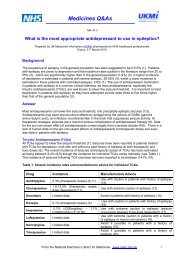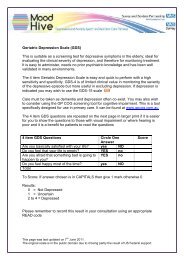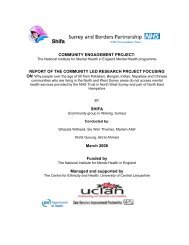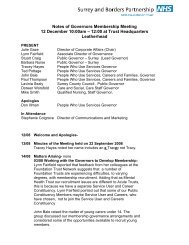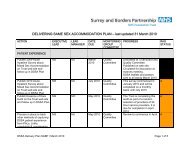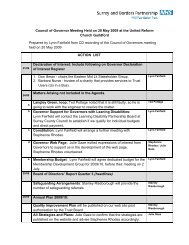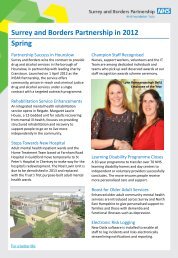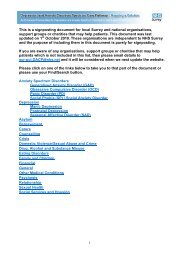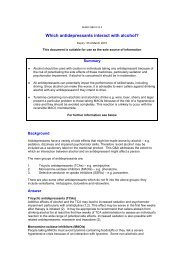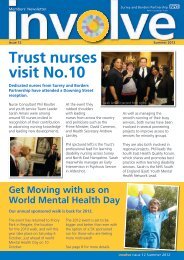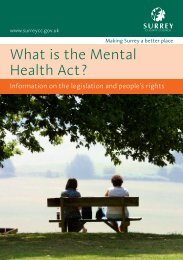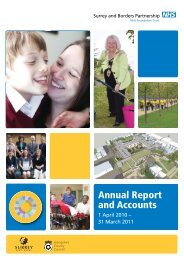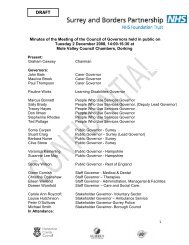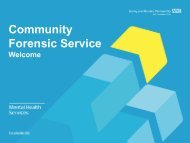Here - Surrey and Borders Partnership NHS Foundation Trust
Here - Surrey and Borders Partnership NHS Foundation Trust
Here - Surrey and Borders Partnership NHS Foundation Trust
Create successful ePaper yourself
Turn your PDF publications into a flip-book with our unique Google optimized e-Paper software.
Editorial<br />
Expectations <strong>and</strong> You<br />
Consider the continuing controversy<br />
over the benefits or costs of psychiatric<br />
diagnosis. Is it possible that the<br />
expectation set up in the patient <strong>and</strong><br />
their social circle, once a diagnosis of<br />
schizophrenia or depression is made, in<br />
itself serves to make the implicit<br />
prophecy entailed in such a diagnosis<br />
come true? Because of the powerful<br />
self-fulfilling prophecy effect of a<br />
psychiatric diagnosis – is it possible that<br />
users of mental health services would<br />
benefit more from ab<strong>and</strong>oning the use<br />
of such labels?<br />
At the heart of the education system,<br />
psychologists contend, are ever-present<br />
self-fulfilling prophecies. We constantly<br />
stream children <strong>and</strong> students into better<br />
classes or universities, then wonder why<br />
they do better, when the power of<br />
expectation <strong>and</strong> self-fulfilling prophecy<br />
might be the answer, rather than any<br />
inherent benefit of an elite education.<br />
Our <strong>Trust</strong><br />
Is it possible, coming back to research in<br />
our <strong>Trust</strong>, that the expectation of whether<br />
or not you are going to do research<br />
massively influences the outcome? Might<br />
it be of benefit to the <strong>Trust</strong> <strong>and</strong> the<br />
doctors working within it to transform<br />
the expectation so that we ‘become<br />
expected’, by managers, peers <strong>and</strong><br />
ourselves, to generate <strong>and</strong> publish much<br />
more research than we currently do?<br />
And doctors? Why should doctors<br />
bother to do research? Surely doctors’<br />
primary function is to heal the sick, <strong>and</strong><br />
other activities become a distraction?<br />
Can research by used by some as a<br />
‘noble’ from the heaving clinic? How do<br />
eminence <strong>and</strong> academic honour<br />
correlate with clinical acumen? Do<br />
publication lists still appear as a magic<br />
key in unlocking merit awards?<br />
There are some serious obstacles that<br />
will confront any doctor attempting<br />
research. Firstly, finding the time,<br />
support, advice <strong>and</strong> resources to<br />
conduct the study. On top of a<br />
burdensome caseload, anyone in an <strong>NHS</strong><br />
contract who is successful in producing<br />
papers is frequently met with the<br />
suspicion that they cannot be pulling<br />
their weight clinically.<br />
Half way through the study someone<br />
will usually helpfully point out some<br />
methodological consideration that<br />
renders all your meticulous data<br />
collection redundant, so you are faced<br />
with the prospect of starting all over<br />
again.<br />
Most papers hide the key story of the<br />
research project, which is in fact how the<br />
investigators overcame, through adept<br />
improvisation, often on the hoof, various<br />
unexpected impediments tripping them<br />
as they attempted to recruit subjects, or<br />
measure some variable.<br />
Once one nightmare study was over <strong>and</strong><br />
the data was presented at various<br />
conferences, a researcher was asked how<br />
he would do the study differently if he<br />
could start all over again. His response<br />
was that he would not do it at all.<br />
Once you assemble the data, statistics<br />
need to be applied. You visit statisticians<br />
with trepidation, remembering to pack<br />
your calculator. They take one cursory<br />
look at the reams of numbers you had<br />
painstakingly calculated <strong>and</strong> she bursts<br />
out laughing because (a) you measured<br />
the right thing but in the wrong way or<br />
(b) you measured the right way, but<br />
chose the wrong thing to measure or (c)<br />
you didn’t recruit enough subjects or (d)<br />
the measuring instrument you used isn’t<br />
compatible with the statistical test you<br />
hoped to apply…. And so it goes on.<br />
Some people find that, once you have to<br />
start using fancy statistics to illuminate<br />
your hypothesis, the finding isn’t worth<br />
the c<strong>and</strong>le. This should reassure the<br />
statistically naïve that genuine<br />
discoveries are still possible for the<br />
innumerate. Indeed in the world of<br />
research, suspicions mount as the<br />
statistical tests multiply.<br />
Another wonderful revelation was the<br />
(geeky nerdy) joy in just inspecting the<br />
raw data, like graphing it, without<br />
6 <strong>Surrey</strong> <strong>and</strong> <strong>Borders</strong> Online Journal www.sabp.nhs.uk/journal



